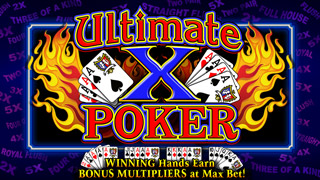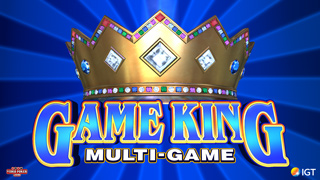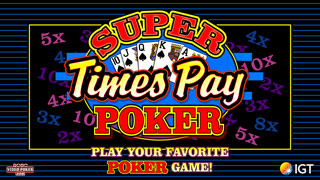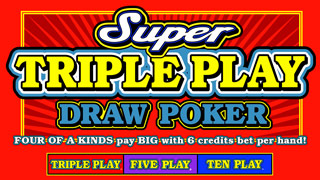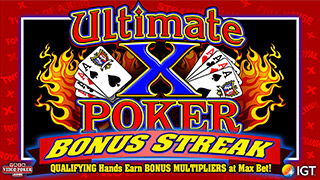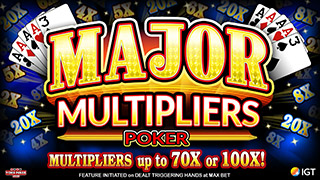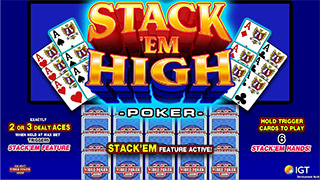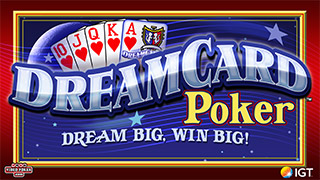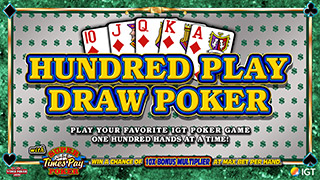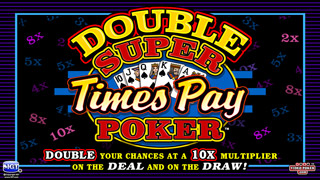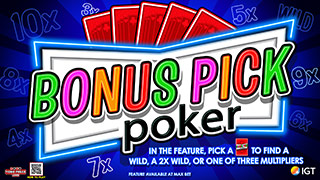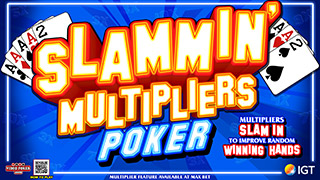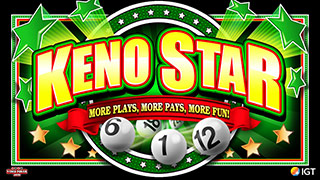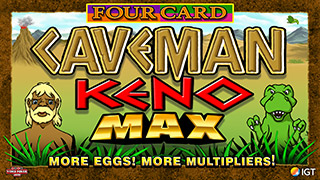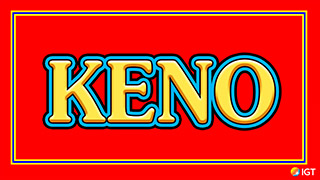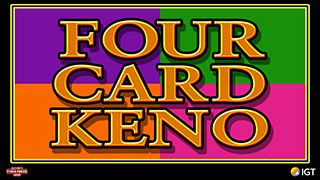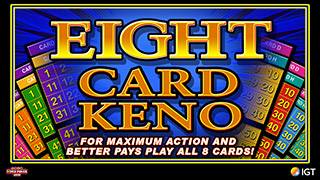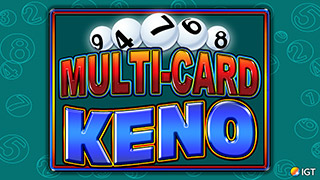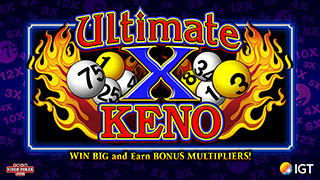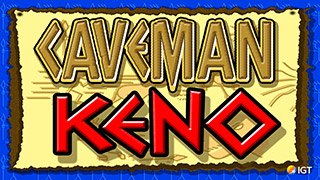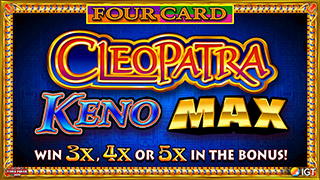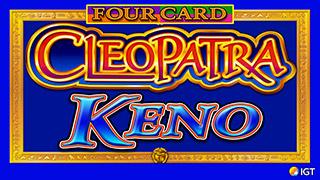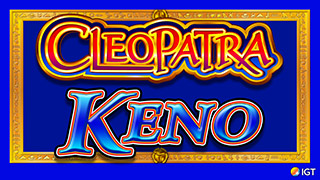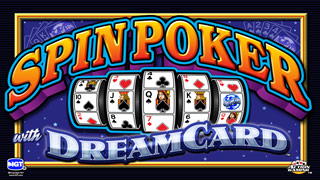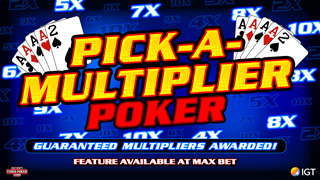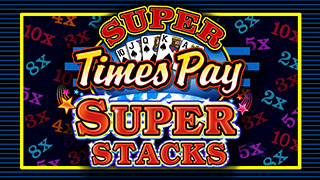Not so fast... AC may in fact be rigged (legally)
-
roveer
- Senior Member
- Posts: 458
- Joined: Mon Oct 09, 2006 1:20 am
Not so fast... AC may in fact be rigged (legally)
I was searching around the the internet last night and came upon this website casinogardnerville.com which had all these articles concerning Atlantic City Video poker being a "slot machine" not a true video poker machine as defined by Vegas regulations. Here are the articles. I must say, I now call into question whether the machines I've been playing for the past 2 years are nothing more than fancy slot machines. I think I'm going to try and formulate a series of very directed questions and than find my way (via my host) to the slot manager or whomever would be responsible. If it's true, that these machines do not play by RNG+pay tables than I don't think I'd play in AC any longer. It would appear from these articles that the AC rules are quite a bit different than that of Vegas.I chose to put this into a new topic so we could discuss this specifically as it relates to AC. I know that there are a number of AC players on this board.
Do The Casinos
Cheat At Video Games?
This is the exact sequence that started me thinking along the lines
for this chapter: jack of diamonds, three of hearts, four of spades, five of
spades, six of clubs. I was playing the 9/6—4,700 coin Jacks or Better Draw poker
machine at the Rio in Las Vegas. Naturally, I held the four cards to the
straight and discarded the jack.
Bingo! Another jack popped up to
replace the jack that I had discarded.
"That happens a lot, doesn't it," said the beautiful AP, my wife and
playing partner, who was playing her own 9/6—4,700 coin machine right next to
me. It was a statement of fact. "Does it?" I asked.
"I think so," she said.
"I've noticed it a lot." "I'll look for it," I said.
The very next time I had a four to a straight, it happened again. This time it
was a ubiquitous eight that made its appearance when I needed an ace or nine.
"It happened again," I said to AP. It's happened three times to me
this morning," said AP.
"You think the Rio rigged the computer?" I asked.
"I doubt it," she said. "If this machine is rigged it would be
the manufacturer."
"You think it's made this way?" I asked. "Every time four cards
to a straight comes up, the replacement card is the same as the discard?"
"That would give the casino some advantage, wouldn't it?" she said.
"But I doubt if it would be every time—otherwise people would
notice."
"We noticed," I said.
The next several times either one of
us received four to a straight the replacement card was not the same as the
discard. Then it happened again.
"There are 47 cards remaining in the deck," I said. "Three of
them are the same as the discard. That's three in 47. We're seeing it half the
time wouldn't you say?"
"Well, we're certainly seeing it more than six percent of the time, which
is what the real likelihood of it being." (6.38% to be exact.)
So for several weeks, we kept track
of the phenomena. We played the same two machines every day for an hour or so
in the morning. Gradually, the phenomenon began to proportionally decrease. The
proportional number of times a discard was replaced with the same card on four
to a straight flattened out. However, by the end of our little experiment,
there was still a feeling that something was amiss with these particular
machines.
"About 25% of the hands have been
replaced with the same card," said AP, looking over our records.
"It's not really a very big sampling," I cautioned her. "If we
played several thousand four-to-a-straight hands, we would get a much better
idea of whether this was a normal fluctuation or if the machine's computer has
been fixed in some way. As it is, we played a 110 of these hands—and in the
beginning we were getting it a lot but it's trailed off. Who knows?"
"But think of it," she
mused. "Any hand can be tampered with. We just noticed this particular
one. What if there are others, so subtle that we didn't notice them?"
Do The
Casinos Cheat At Video Games Part2
"We'd be throwing our money away," I said. "We think
we're playing a break-even machine and in reality we're being taken to the
cleaners."
"It would be a dirty business," she said.
When AP and I arrived back in New York from our month-long sojourn in Las
Vegas, I had an interesting surprise awaiting me. The September 1994 issue of
Arnold Snyder's masterful, quarterly newsletter Blackjack Forum was in the
mail. On page 35, Don Paymar, an excellent video-poker columnist and author
[Video Poker Precision Play], writes about his own feelings, based on his own
playing experiences, that something might be amiss on "at least some
machines" in Nevada.
He recounts observations of "too often receiving a card of the same
rank as the discard, primarily when drawing one card to two pair or to a
four-card straight. For example, discarding the jack from 4-5-6-7-J (not
necessarily in that order) on a common Draw Poker machine, we too often receive
another jack." He admits that in a small number of trials, it would not be
unusual to see this unusual event occur in three of 16 such hands—since
anything can and does happen in the short run. But according to Paymar it's
happening much more frequently than that.
He writes: "How about records of dozens of playing sessions, and during
every session getting a card of the same rank between 25% and 55% of the time,
with an overall average of 43% instead of the expected 6.4% (three in
47)?"
Whenever someone harps your fear aright, you figure there must be something
in it. Well, Paymar had harped my fear all right. While neither my, nor
Paymar's more extensive experiences playing Draw Poker machines were enough to
scientifically "prove" that something was seriously wrong with these
machines—whether deliberately or accidentally— it was enough to make me
consider the "possibility" that this was so.
So I contacted my computer expert, Dr. James Schneider (see my book, Break
the One-Armed Bandits!) to see if he could shed some light on the subject of
possible casino and/or manufacturer chicanery in the world of video poker.
Frank: I'm interested in casino and /or manufacturers cheating at
video-poker. How it could be done and whether it is done.
Dr. Schneider: It can be done in any number of ways but I don't know if it
is done. I think in the United States there must be some laws about it.
Frank: In Nevada, Colorado, and New Jersey and maybe some other places, the
individual states or casino control commissions have rules that any game that
is represented by cards must deal from a 52-card deck and be random. The games
with jokers would deal from 53-card decks.
Dr. Schneider: The shuffles have to be random? Frank: Yes…I think.
Dr. Schneider: You haven't actually talked to anyone from these commissions?
Frank: No.
Dr. Schneider: Or looked at their regulations?
Frank: No. It's a good point. I've just assumed that all the commissions have
laws against such things because other writers have written that they do. The
commissions are the next stop I guess. But let's discuss the random shuffle
idea.
Dr. Schneider: A random shuffle doesn't preclude the house from having an
edge. The payouts for the various hands would dictate what the house edge would
be.
Frank: The machines show their payouts per hand and it's possible to calculate
just what the house edge is. There's no secrecy there.
Do The
Casinos Cheat At Video Games Part3
Dr. Schneider: Cheating then would have to concern the actual
randomness of the shuffle. That would be the first place to look. Perhaps the
machine has been programmed to never allow a royal flush. Or, only allow the
royal flush half or three quarters of the time. If I take the three-quarter
example, when the cards are dealt out, any time a king of hearts comes up, the
ace of hearts is behind it. Thus there can never be a hearts royal flush. Let
us assume that machine deals out 10 cards, the first five of which are visible…
Frank: Parallel dealing.
Dr. Schneider: Parallel dealing. The other cards are behind these first
five. So behind the king of hearts would be the ace of hearts—at all times. You
would never know this because when you had three or four cards to a royal flush
in hearts, you wouldn't discard the king of hearts so you wouldn't ever see the
ace of hearts. Or, if a player made a mistake and did discard it, it would be a
curiosity that the ace was behind it. What I've just described wouldn't even be
a subtle programming technique. You could program a color in its place. Four to
a royal in hearts are red, the discard goes and you receive a black card—you
might even get a high straight. The programming could even specify that a
normal flush appear. So, you program the machine this way. You have a sequence
of 10, jack, queen, and king of hearts. The fifth card is the six of diamonds.
Behind it is sitting the ace of hearts. When you discard the six, that ace will
show and you have yourself a royal flush. Now, the machine senses the ace and
simply substitutes a four of hearts. The player gets a flush but doesn't get
the royal. The player would never suspect a thing. The player would be happy he
received the flush, a little disappointed that he didn't get the royal and the
casino has successfully cheated the player.
[Here I explained to Dr. Schneider my concern that machines I had played in
Las Vegas might be substituting like cards for discards in four-to-a-straight
hands.]
Dr. Schneider: Such a situation could be happening. However, I doubt that a
programmer for one of these companies, even if he were told to cheat the
customer, would do so in such an obvious and unsubtle way. After all, you
picked this up quickly and anyone who played for a decent length of time would
pick this up also. The four-to-a-straight hand occurs frequently enough that a
like-card replacing a discard would certainly be noticeable—especially if it
were 20 percent of the time or more as you indicated. If it is happening, there
could be a problem with the random number generator's programming. It would be
a programming flaw, not an attempt to cheat.
Do The
Casinos Cheat At Video Games Part4
Frank: You mean, the shuffle isn't actually random?
Dr. Schneider: Remember that there isn't actually a shuffle, just random
numbers generated from a random number program that simulates what a shuffle
would be. If there is a flaw in the random-number program, you might get a
shadow effect—thus, the straight sequence has the discard card shadowed with a
like card. That shadow effect could be involved with all the cards in a
sequence. Maybe behind each one is a like card. It wasn't done on purpose, it's
just a design flaw.
Frank: What if it's a serial deal, and not a parallel deal, as many of the
newer machines are supposed to be? The sixth card off the top of the deck is
the first card given for the first discard, second card off the top of the deck
is given for the second discard and so forth? Just like regular dealer would do
in a real card game.
Dr. Schneider: Just as a slight-of-hand artist would do with a real deck, a
programmer could do with the program. This could be even more sophisticated
than anything found on a parallel program. The program could wait to see what
the player discarded and then always give a bad card—any bad card in a
seemingly arbitrary way. No one would know the difference. No seeming pattern.
Just bad draws. Say you had two jacks but simultaneously four cards to a royal
flush. Also say the player opted to keep the two jacks and not go for the
royal—the dealer would not give him a third jack or any other pair. This could
be devastating. The player would just know he was losing an awful lot. Even bad
players could get hurt more than normal.
Frank: That's a problem right there. Losing a lot wouldn't affect many
players since they are used to losing a lot— they expect it. This could be
going on and except for a few sharp players, no one would even sense it. In
video poker, you tend to lose more sessions than win to begin with—even for
expert players. But experts can keep the losses to the minimum and come roaring
back when the big hands and sessions make their appearance.
Dr. Schneider: You think the natural tendencies of gamblers would play into a
scheming programmer or casino?
Frank: Yes. The big hands just don't show up, or show up much less than they
should. Who would know?
Dr. Schneider: I just don't see the casinos doing this because they don't
have to do it. They structure the games and order the type of programs they
want. If a casino wants to offer a good video game, it can; if it wants to
offer a bad video game, it can. Why cheat?
Frank: Because competition is fierce. Because they want all the players to play
in their places and not the competition's places and that means they even want
good players to play in their places. But to take the good player's money, the
casinos have to finagle a little. That would be reason to cheat. The good
players will only play the best machines and the good players know exactly what
these machines are.
They won't play an inferior-paying machine. So lure the good players in with
supposedly full-pay machines and cheat them so your casino can compete with the
other casinos. It's cut-throat competition. That's the motivation to cheat. The
more casinos—the more cheating, not the less cheating. Offer seemingly great
paying machines but rig them.
Do The
Casinos Cheat At Video Games Part5
Dr. Schneider: That's a little out of my field—why a casino would
cheat. I still don't buy that they do. It would be dangerous—especially in
states where the casino industry is regulated. Think of the impact on the
public if it were ever proven that the video games are rigged. It would have a
devastating effect on legalized gambling.
Frank: Probably. Yet, people still gamble in illegal gambling parlors where the
house is composed of known crooks. But I do think you are right. Public
sentiment would be a factor in keeping the casinos honest.
Dr. Schneider: That's the motivation for not cheating or programming such
things as we've been discussing.
Frank: I've always wondered this—how can one program randomness? Isn't that a
contradiction in terms?
Dr. Schneider: Yes, seemingly. Randomness is an interesting study because
there are subtle, usually short-lived, patterns in everything. Randomness and
probability work hand in hand. You therefore program randomness by making sure
that the probabilities over a sufficiently long period of time work themselves
out according to theory or as close to theory as to give you a 99 percent
confidence rating in the integrity of the program. By the way sometimes they
don't. Then, you have a problem. If you give yourself a wide enough range in
your programming, millions and millions, or billions of trials, more than
likely you will hit an approximation of randomness. That is good enough to
assure an honest game.
Frank: Could a programmer program patterns into randomness and not be aware of
it? And then it shows up?
Dr. Schneider: Anything is possible. It's unlikely that using the standard
randomness programs that such a thing would happen but a chip could be faulty.
Frank: So you think what AP and I observed and what others have reported might
be an error and not deliberate tinkering?
Dr. Schneider: It might be an error in either one of two
places. First, it could very well be a programming error. I still would find it
hard to believe that a programmer would cheat in such a clumsy way or that the
casino industry would risk such a thing. Therefore if that pattern which you
observed is real, then I have to think it's a shadow effect, a faulty chip, or
something of that nature. Not deliberate cheating. So that's the first place an
error might be. However, the second place the error might be is with the
observers. You might have noticed a short-term pattern that was ephemeral.
Think of how many hands of video poker you played before you started to notice
this particular pattern. You might have played hundreds or even thousands of
such hands—four-to-a-straight—and never had the situation appear—or, it
appeared within a few appearances of its expected frequency—six percent of the
time or thereabouts.
Also think of how often that machine was played by others when you weren't
there. Did they experience the same thing? So it could be that your
observations are at fault, not the programming. The casino or the manufacturer
is not cheating you. You are getting the game as it appears to be. The casino's
edge is whatever is posted and that's all there is to it. This pattern isn't a
long-range pattern, it's just a blip that comes and goes. You happened to catch
the blip and recognize a pattern. That's how randomness works. At any point,
there seems to be something meaningful, organized, and deliberate happening—except
it really isn't and it soon disappears to be replaced by other seeming
patterns. The whole is patternless—except that it fits our expectations based
on probability theory.
Frank: So the only pattern—if the machine is
programmed properly—is based on long-range probability?
Do The
Casinos Cheat At Video Games Part6
Dr. Schneider: That's it.
Frank: Assuming honesty.
Dr. Schneider: Assuming honesty.
I thought I had laid my qualms to rest about the possibility of casinos
and/or manufacturers cheating at video poker, when I was reminded of a series
of articles and letters in Blackjack Forum in 1992-93 concerning video
blackjack. I quickly went through my back issues.
There was a highly revealing short piece by Joel H. Friedman titled
"Beware of SEGA Robo-Dealers" in the December 1992 issue. After
discussing the excellent rules and payouts for the SEGA Blackjack Super Magic
Vision model, rules and payouts that give the player a better than five percent
advantage— if the game were "honest"—Friedman writes: "So how
can casinos make money with a game that has such favorable rules? The SEGA
handout lists as a feature of their machine, 'Operator selected percentages
from 84% to 99% in one percent increments.' It seems that the blackjack rules
are fixed, but the house edge is adjustable.'
The SEGA machines did not meet the regulatory requirements of Nevada, since
they represented themselves as card games, when in reality they were slot
machines. The difference between the two is easy to delineate: randomly
shuffled card games manipulate the payout schedule to give the casino and/or
player an edge, whereas a slot machine manipulates the results. It's the
difference between a dealer shuffling and dealing honestly or a card mechanic
who can decide which cards will come up next in order to help the house or
player win more. In video-poker parlance, the former is a random shuffle, the
latter a non-random shuffle.
The conclusion of Friedman's article stresses that SEGA machines can be
found in casinos all over the world—especially on cruise ships, in Asia and in
Europe.
In that same issue, Allan Pell writes "that outside of Nevada and New
Jersey [or any locality that strictly controls casino practices] no protection
exists for the unsuspecting player. In effect, the manufacturers are cheating
you—legally that is! Devices may lure players with great rules, but the
software can defeat you with everything from peeking and dealing seconds, to
programming that prevents you from getting a blackjack in your lifetime. This
also applies to other video games—seven out more in craps, etc. The machines
can be programmed to defeat you, regardless of the supposed odds of the
game."
Okay, after finishing Friedman's and Pell's excellent and informative
articles, one would think that the safest course for a video-poker,
video-blackjack, video-anything aficionado would be to play in regulated
casinos where you were sure of the game you were getting. Remember, you want a
game where randomness dictates the fall of the cards, the roll of the dice or
whatever; you want a game where the payout schedule can be analyzed to show
just what the percentages are and that these percentages reflect what is
actually happening vis a vis the game you are playing. Let me repeat—a slot
machine does not have to tell you what percentages you face, it's programmed to
pay back whatever the casino wants it to give back. According to Mr. Handle
(see my book Break the One-Armed Bandits!) slots in his casinos are programmed
from 83 to 99 percent and that is generally the range for most reputable
casinos in the country.
However, the very next issue of Blackjack Forum (March 1993) had a truly
disturbing letter from an anonymous individual in New Jersey discussing the
video-blackjack machines in some casinos in Atlantic City—a regulated state.
This individual writes: "Upon questioning casino personnel, and the New
Jersey Casino Control Commission people, the following comments were made: the
casino slot manager says these [video-blackjack] machines were registered as
slot machines [italics mine] and meet all the NJCCC regulations pertaining to
slot devices. The NJCCC person agreed, noting that the game is a 'randomly'
dealt video-poker game with a set payout of anywhere from 83% to 99%, which
meets the NJCCC requirements."
Do The
Casinos Cheat At Video Games Part7
The letter writer continues: "A slot mechanic employee told us he
sets the payouts on these video-BJ machines the same as any other slot
machine…he assured us that the payouts were different for each machine…If it is
a so-called 'slot device' with a set payout, this game borders on being
illegal, or at least a misrepresentation."
This is disturbing news because, if true, it would mean that the payout
schedule on these machines had nothing to do with the actual payback
percentages. If several video-blackjack machines of the exact same type are
paying different amounts—then the game is misleading—and, sadly, my fellow
video-poker, video-blackjack writers have unknowingly misled themselves and
others as to the nature of the games being offered in New Jersey (and other
states) because no one has bothered to research the regulated states' actual
rules governing video-poker, video-blackjack, video-anything machines.
Finally, to fuel my frustration and mounting ire, the September 1993 issue
of Blackjack Forum, once again has Allan Pell writing on these slot machines in
video-machine clothing. In an article entitled "Rip-Off Robo-Dealers
II," Pell goes after the Japanese video-game manufacturers for employing
"an electronic variable hold—which in essence are dip switches (toggles)
that vary the programming" on their machines. "All sorts of little
tricks can be programmed in without your knowledge, like never dealing you an
ace when your first card is a ten, etc. Programming tricks can overcome any set
of rules with a seemingly positive expectation."
Pell also states that not only is the Japanese company SEGA selling these
machines in the Pacific rim casinos but that cruise ships are loaded with them.
In addition Pell states that "manufacturers like Sigma, Irem,
International Games Technology, and Bally's operate and sell devices outside
the regulated jurisdictions," the implication is that even machines that
appear to be standard Las Vegas-type machines may actually use variable
programming. Pell concludes his piece: "Expect to see new forms of
electronic gambling introduced, but be wary. The game may look the same as a
unit on the floor in Vegas, but it only takes a different chip inside it to
turn it into a bankroll vampire."
So my quandary continues and I must return to the initial question of this
chapter: Do Casinos Cheat at Video Poker and Other Video Games? Fact: the
variable programming machines are out there, according to Pell and Friedman, on
cruise ships and in non-regulated jurisdictions and in foreign casinos. Fact:
we know, based on Dr. James Schneider's remarks, how easy it would be to fix
machines so that they wouldn't really be random-shuffle machines. Fact: casinos
exist for one reason and one reason only—to take your money (albeit in as
pleasant a way as possible). Fact: both AP and I, and others, most notably Dan
Paymar, have noticed some strange "patterns" on some draw poker
machines—in a regulated state. Fact: the anonymous New Jersey letter writer
apparently discovered this type of slot-machine-in-video-machine-clothing in
Atlantic City casinos—another supposedly regulated venue.
So what do all these facts add up to? A big CAUTION. As Dr. Schneider said,
it's hard to believe the casinos would risk the bad publicity inherent in the
public finding out that they are less than honorable in executing their games.
Still, some casinos do bar card counters at blackjack, or harass people who
play the Captain's Supersystem in craps, both certainly less-than-honorable
practices. Maybe only certain types of bad publicity would bother them, then?
Do The
Casinos Cheat At Video Games Part8
So I had to do my homework. My fellow gaming writers have assumed that
because New Jersey is a regulated state, its regulations are the same as Nevada
concerning video-poker machines. Had anyone really bothered to talk to the
members of the New Jersey Casino Control Commission or ask to see a copy of the
regulations? If the anonymous letter writer in Blackjack Forum was right—New
Jersey did not have the same rules governing video-poker machines as did
Nevada.
I called the New Jersey Casino Control Commission to see if I could ease my
fears or fuel my fire. After all, the control commissions of the various gaming
jurisdictions set the rules that the casinos must abide by. Supposedly these
commission exist to protect us—the players. I spoke with Tony DiFlorio who told
me that while the video-poker machines must conform to the same payback
percentage range as any other slot machine, that is 83% to 99% return,
"they are considered slot machines" and that there are no separate
requirements for them as in Nevada. When I asked him if they must be based on a
totally random shuffling of the cards, and that each hand must theoretically
appear with it expected frequency, he stated that there were only two criteria
for the machine. The first— that it fall within the payback scheme (83% to 99%)
and the second, that "every sequence be in the programming."
"But that means," I said, " that if a natural royal flush is
a 40,000 to one shot, the machine could be programmed to pay it once in every
300,000 hands or more?"
"Yes," he said. "The machine has to have the royal flush
sequence in the programming just as a slot machine would have to have for
example the triple 7's but the frequency is up to the programming."
Two days later I received a set of the regulations from John M. Kovac,
Administrative Practice Officer for the New Jersey Casino Control Commission
concerning slot machines in New Jersey. No distinctions were made between
video-poker and other slots. The information that Mr. DiFlorio had given me
checked out. Indeed, the letter writer to Blackjack Forum had been correct.
Video-poker machines in Atlantic City are slot machines and the probabilities
are not necessarily the same as they would be for similar machines in Nevada. Remember,
Nevada is based strictly on the random shuffling of 52 (or 53) cards.
The hands will appear in the long run within their expected frequency range.
This does not have to be so for New Jersey Casinos. The game will be random,
yes, but random the way a slot machine is random—that is, based on a program
that dictates the probabilties and not based on the probabilities in a 52 (or
53) card deck.
Do The
Casinos Cheat At Video Games Part9
Well, there it is. The payback schedule on the front of the
video-poker machines in Atlantic City can not be considered as an
unquestionably accurate gauge as to the playability of a particular Atlantic
City machine. It is theoretically possible to have a machine that appears to
have a positive expectation when, in reality, it would be returning the minimum
83% because the programming is variable. Because video-poker machines in
Atlantic City are considered slot machines, the payout schedule should be viewed
just the way a payout schedule is viewed on a regular slot machine—as
informational material only, not as an indication of the percentages inherent
in the game.
Next, I spoke to Rex Carlson, Laboratory Manager of the Nevada Gaming
Control. He assured me that the video-poker machines in Nevada must conform to
the random shuffle principle "of a 52 card deck" and that "the
programming cannot have any secondary decisions in it. If the royal flush is
about to be dealt the machine can't say, 'No royal on this hand.' The machine
also can't say, 'I've given out too many paybacks today, I'd better cut back on
winning hands.'"
Then I asked him if the payout schedule is the only way a casino can get the
edge in Nevada machines. "Yes," he confirmed. "If a player understands
how to read the chart, the player can determine exactly what he faces, unlike a
regular slot machine where the percentages are unknown." Had he ever heard
of variable programming for video-poker machines? "Yes, in other areas of
the country and in foreign countries you might find these machines but they
violate the law in Nevada. Video poker in Nevada is a game of skill and luck.
That skill factor must be there for a machine to be a video-poker machine. They
are not slot machines."
Now, many of you who play in Atlantic City will be faced with a
dilemma—should you continue to play? My guess— and it's only a guess mind
you—is that most of the machines in Atlantic City are exactly like the ones in
Las Vegas— that is they use a random shuffle with no variable programming and
no secondary decisions, and the payout schedule is the deciding factor in
determining the casino's edge. Why do I think this? A quick perusal of the
payback charts shows that Atlantic City machines are rarely full pay. Most are
ranging from 92% to 96% if the payout schedule is accurate. The average payback
for all Atlantic City slot devices is approximately 92%. These are bad bets for
the player and great money makers for the casinos. The Atlantic City machines
are manufactured and programmed by the same companies that service Nevada—would
it really be necessary to include a variable program in the Atlantic City
video-poker machines to reduce them a few more percentage points—even though
such a practice would be allowed? Hopefully, no. The operant word here
is—hopefully.
Thus, if you are playing an Atlantic City video-poker machine with a 93%
payback based on its payout chart, there's a decent chance that it is indeed a
93% payback and that all the sequences are in the programming based on their
actual probability. (Why you would be playing this machine after reading this
book is beyond me!) However, what if you should find that rare Atlantic City
machine that seems to be a full payback? Here would be the opportunity for the
casino to use a machine that makes "second decisions" and changes the
percentages. Dilemma time. The seemingly better-paying machines might just be
the worst paying ones! And the machine would be legal—rigged against you,
misleading you, yes, but legal nevertheless.
Do The
Casinos Cheat At Video Games Part10
The bottom line? Here it is. For those of you who can play in Nevada,
assuming the problem of like-card discard was just a "blip" or at
worst a programming flaw in some machines as Dr. Schneider suggested, all the
strategies in this book can be confidently applied because the game is what it
appears to be—video poker based on a random shuffle with no variable programing
or secondary decisions. The hands will come up with their expectaed probability
in the long run.
Unfortunately, I can't recommend the Atlantic City video-poker games because
I can't be confident that the strategies outlined in this book would be the
most effective strategies to play on variable programming machines or secondary
decision machines—especially for the supposedly better-paying machines. If, for
example, the royal flush is a one in 1,000,000 chance instead if a one in
40,000 chance in Atlantic City—a Draw Poker Jacks-or-Better hand such as ten of
spades, jack of spades, queen of spades, king of spades and a king of hearts
would probably return more by keeping the two kings and discarding the other
cards. You might have to play the Atlantic City game based on the "a bird
in the hand is worth two in the bush" principle. Take your little wins
when you get them and be happy. For Atlantic City, the best principles to use
would be the ones discussed in detail in my book Break the One-Armed Bandits!
Choose a video-poker machine as you would choose a slot machine. Use Mr.
Handle's revelations concerning where the loose machines can be found in a
casino, and couple this with the Julian and Darwinian Slot Selection
principles. Use the money management techniques of a slot player because you
could be playing a slot machine dressed in video-poker machine's clothing.
But what of other jurisdictions in America? With gambling fever spreading
like wild fire throughout the country how can players know what they're
playing? They can if they take the time to look over the regulations governing
the machine games in the casinos where they wish to play. All regulatory states
must explain the criteria of their machines. New Jersey isn't cheating the
players (technically)—the rules clearly show what their machines have to
be—slot machines returning 83 to 99 percent. The fact that the players and
gaming authorities assumed the New Jersey rules were the same as Nevada is their
fault.
-
faygo
- Video Poker Master
- Posts: 2925
- Joined: Tue Jan 09, 2007 6:55 am
I don't understand the relevance of these articles to todays machine. What dates are discernible are 20 years old. I did not see anyhard evidence in these articles,one way or the other, just a lot of supposition and speculation. I don't think the VP in AC is rigged. Prove me wrong.
-
BillyJoe
- Video Poker Master
- Posts: 3198
- Joined: Sat Aug 23, 2008 2:00 pm
I think this would be an excellent topic for Bob Dancer's radio show (are you listening, Bob? ). I actually suggested that Bob get a NJ Gaming Commission person as a phone-in guest when NJGC went from an independent entity to a division of the NJ Revenue Board (the same folks that tax the NJ casinos). To my knowledge, I don't think that has happened.
While it is true that the articles' references are dated, the devil is in the details, so what VP machines are CURRENTLY called in AC Gaming Regulations would put some fears to rest (hopefully).
While it is true that the articles' references are dated, the devil is in the details, so what VP machines are CURRENTLY called in AC Gaming Regulations would put some fears to rest (hopefully).
-
New2vp
- Video Poker Master
- Posts: 1881
- Joined: Mon Sep 11, 2006 4:02 am
I yield my number-of-words-per-post title to roveer.
-
roveer
- Senior Member
- Posts: 458
- Joined: Mon Oct 09, 2006 1:20 am
I don't understand the relevance of these articles to todays machine. What dates are discernible are 20 years old. I did not see anyhard evidence in these articles,one way or the other, just a lot of supposition and speculation. I don't think the VP in AC is rigged. Prove me wrong.
So faygo,
Just because there are a number of 20 yo references that means it can't possibly be relevant? Listen. I'm not a Roswell type guy but the articles raise some degree od suspicion and based on the way the information is structured it bears proving out. I'd rather get these types of questions answered than to continue discussing how I feel the machines are working. It just seems like one is more substantial than the other.
Roveer
So faygo,
Just because there are a number of 20 yo references that means it can't possibly be relevant? Listen. I'm not a Roswell type guy but the articles raise some degree od suspicion and based on the way the information is structured it bears proving out. I'd rather get these types of questions answered than to continue discussing how I feel the machines are working. It just seems like one is more substantial than the other.
Roveer
-
DaBurglar
- Video Poker Master
- Posts: 4535
- Joined: Thu Jun 16, 2011 12:11 pm
I rest my case..... This is what I have been claiming and ranting about.....that it is POSSIBLE !
-
BillyJoe
- Video Poker Master
- Posts: 3198
- Joined: Sat Aug 23, 2008 2:00 pm
Hmmm... found this in the CURRENT NJ Gaming Regs...
13:69E1.28A Standards for the approval of a slot machine game
(a) Except as otherwise provided in this section, each slot machine game which requires a wager shall have a theoretical return to player (RTP) equal to or greater than 83 percent.
(g) A slot machine game that requires skilled strategy choices, such as video poker, shall:
1. Have its theoretical RTP calculated based upon the player exercising optimal strategy during game play;
2. Disclose optimal strategy to achieve the highest theoretical RTP; or
3. Provide mathematically sufficient information for the patron to derive optimal strategy in order to achieve the highest theoretical RTP.
13:69E1.28A Standards for the approval of a slot machine game
(a) Except as otherwise provided in this section, each slot machine game which requires a wager shall have a theoretical return to player (RTP) equal to or greater than 83 percent.
(g) A slot machine game that requires skilled strategy choices, such as video poker, shall:
1. Have its theoretical RTP calculated based upon the player exercising optimal strategy during game play;
2. Disclose optimal strategy to achieve the highest theoretical RTP; or
3. Provide mathematically sufficient information for the patron to derive optimal strategy in order to achieve the highest theoretical RTP.
-
roveer
- Senior Member
- Posts: 458
- Joined: Mon Oct 09, 2006 1:20 am
I rest my case..... This is what I have been claiming and ranting about.....that it is POSSIBLE !
Don't you dare rest anything. We NJ players have to get to the bottom of this at least tip the point that we have removed all doubt in our own minds
-
roveer
- Senior Member
- Posts: 458
- Joined: Mon Oct 09, 2006 1:20 am
Hmmm... found this in the CURRENT NJ Gaming Regs...
<FONT face=Calibri-Bold-Identity-H>
13:69E1.28A Standards for the approval of a slot machine game<FONT face=Calibri-Identity-H>
(a) Except as otherwise provided in this section, each slot machine game which requires a wager shall have a theoretical return to player (RTP) equal to or greater than 83 percent.
<FONT face=Calibri-Identity-H>
(g) A slot machine game that requires skilled strategy choices, such as video poker, shall:
1. Have its theoretical RTP calculated based upon the player exercising optimal strategy during game play;
2. Disclose optimal strategy to achieve the highest theoretical RTP; or
3. Provide mathematically sufficient information for the patron to derive optimal strategy in order to achieve the highest theoretical RTP.
Are these regs on-line or do we need to go to the CCC to get them?
Those statements are pretty vague and create more questions than answers. I can o ly imagine what the complete regs say but I have a feeling that I'll be reading them soon enough.
<FONT face=Calibri-Bold-Identity-H>
13:69E1.28A Standards for the approval of a slot machine game<FONT face=Calibri-Identity-H>
(a) Except as otherwise provided in this section, each slot machine game which requires a wager shall have a theoretical return to player (RTP) equal to or greater than 83 percent.
<FONT face=Calibri-Identity-H>
(g) A slot machine game that requires skilled strategy choices, such as video poker, shall:
1. Have its theoretical RTP calculated based upon the player exercising optimal strategy during game play;
2. Disclose optimal strategy to achieve the highest theoretical RTP; or
3. Provide mathematically sufficient information for the patron to derive optimal strategy in order to achieve the highest theoretical RTP.
Are these regs on-line or do we need to go to the CCC to get them?
Those statements are pretty vague and create more questions than answers. I can o ly imagine what the complete regs say but I have a feeling that I'll be reading them soon enough.
-
DaBurglar
- Video Poker Master
- Posts: 4535
- Joined: Thu Jun 16, 2011 12:11 pm
Ja....that nebulous, meddling "or" after number two above has me totally befuddled....wtf are they trying to do with this type of language in what is supposed to be the FINAL word on gaming issues and ops???? I have asked and asked and asked since playing in AC for specific useful info from casinos staff and management regarding how their vp works, innocuous questions any player has the right to ask.....all I ever got was hot air or offers for some sh**ty buffet....I think i am done playing in AC until we dig some more dirt and answer some more questions. I called the friend last night before I went to bed, the one who supposedly was p'o'd at me for "blabbing" what she shared with me years ago....I told her about this NJ confusion and she basically said it only proves what she claimed, that casinos CAN mess with the VP returns outside of what the paytables advertise. She said "just because the paytable on a 9/6 job machine says it returns 99-1/2% doesnt mean that is what that machine truly does! In Nevada, it is supposed to work that way but I can tell you we COULD set that machine internally to return only 93%, or 95%, or whatever all the way down to some bottom number like 80, or 75, or whatever.....doesnt mean it is, but you cannot GUARANTEE it isnt either. ANd if a casino gets word of a gaming control inspection that MIGHT peak at this machine or that machine, they just lift the cover, pull up the menu and set things straight. In most casinos (in Nevada) this probably does NOT happen, but no way can anyone say it has NEVER happened....as for NJ, I cant say one way or the other, but your results as of late sure do stink!" Then she hung up..... Actually, the 5 cent VP machines are looking better and better! I just have to avoid hitting MAX bet and instead find that elusive "bet 5" button and then pray I DONT get a ROYAL.....wait, what am I thinking??!?!?!?



